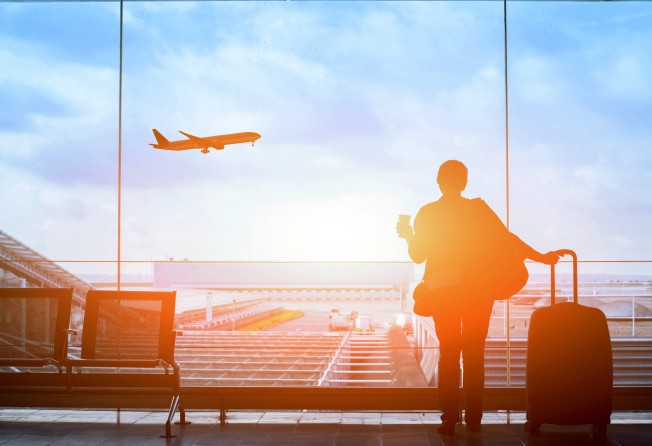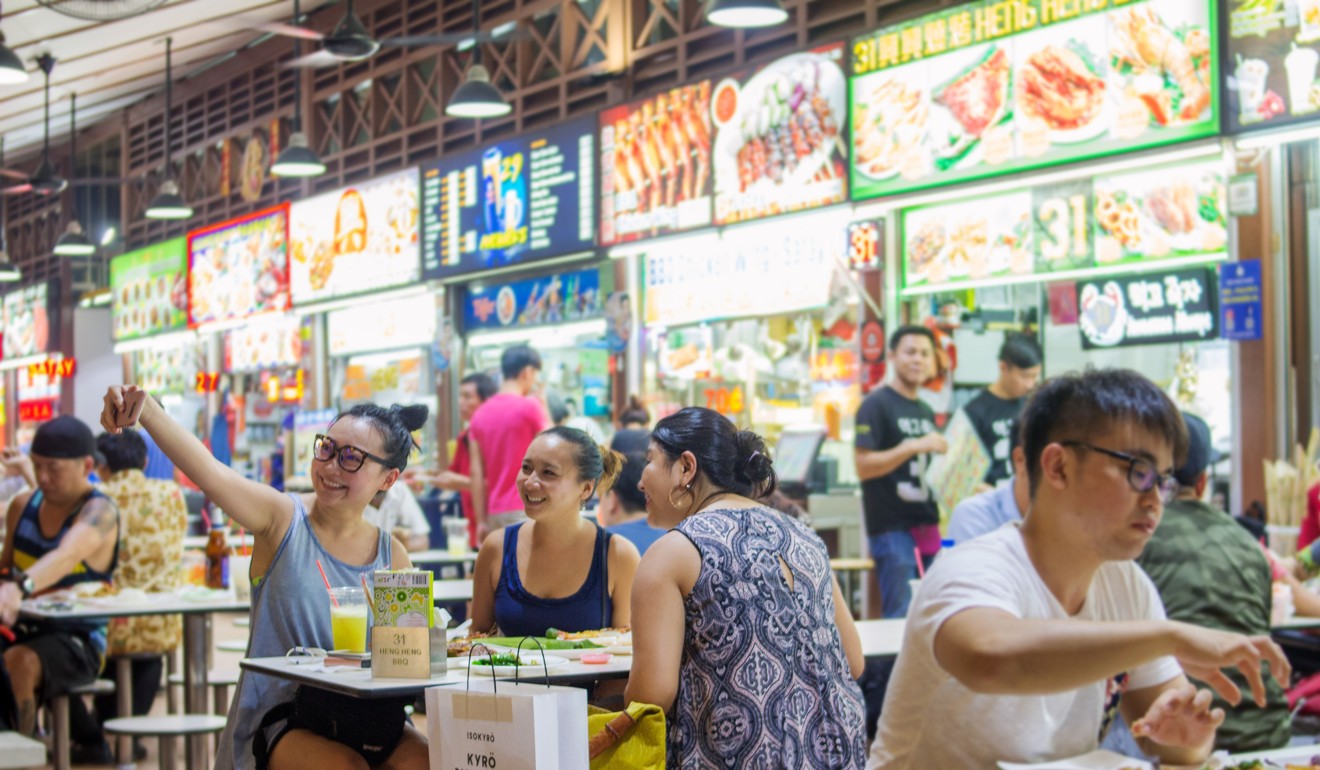7 tips for solo travel inspired by a trip to Tokyo
- Read this advice before you plan a holiday alone

Travelling by yourself comes with its highs and lows. Sure, if something goes wrong, you don’t have anyone with you to get you through it, but also, you don’t have to worry about stressing out your travel buddy because you can’t find your Airbnb address when you’re at the immigration desk.
Japan is one of the best places to visit alone: you can nestle into a solitary routine without judgment. In the morning, you’re not some person sitting by yourself at breakfast. You’re one of eight sitting by themselves at breakfast. In the evening, you’re just another solo bather at the public hot spring. You can eat alone, drink alone, see a baseball game alone.
Here are seven lessons learned from a solo trip to Japan to help you navigate the challenges.
1. Fight the urge to get on your phone when you’re feeling shy
The smartphone is the perfect travel companion. It’s there when you’re lost, providing a map to guide you home. It’s there when you’re lonely, connecting you with friends and family at home with a few taps. It’s there when you’re bored, offering you infinite ways to pass the time.
But if you give into the siren song of your iPhone, you won’t talk to anyone new. And you can’t assume they’re going to want to talk to you, either. (Strangers in Tokyo will generally respect your privacy and leave you alone unless they get the sense you’d like to chat – unlike in American dive bars or Scottish pubs, where the default is for locals to strike up conversation.)
On my first full night in Tokyo, I fancied a nightcap. I ambled around until I spotted a bar entrance that looked like a theme-park version of a dungeon. Walking into the smoky unknown felt like being in an old Western movie – that clichéd scene where the new guy walks through the saloon doors and the piano stops. I eased myself onto a teetering stool at the bar.
My first inclination wasn’t to talk to the other customers. What was stronger was the urge to get out my phone and hide inside its glowing warmth. Doing so would have cut me off from the people curiously glancing at me, seemingly the only American there. So I stared – straightforward, sometimes at the bottles on the back bar, sometimes at the decor. I had a mini smile plastered on my face to tell the others, “Hey! I’m friendly!”
My approach worked. I placed a drink order in English but peppered in what Japanese I know, alerting the bar that I couldn’t speak the local language but was sociable and would try. The bartender then asked me where I’m from, and with my answer, another customer asked me what I was doing in Japan. A drink later, he was telling me about a woman from Okinawa he had a crush on, asking me for dating advice.
2. Accept that no matter how hard you try to fit in, you’re going to stand out
Sometimes I’ll have the confidence to walk right into a place, like a dungeon bar, without too much thought. Other times, I’ll circle the block a thousand times, then worry that someone might have noticed that I’ve been circling the block. I’ve walked into establishments, panicked at how small or crowded or confusing they were, and turned around to leave as quickly as I came. I have done this, feeling like a loser, on about a thousand occasions.
For some people, travelling alone can cause normal activities like choosing a restaurant to become paralysing obstacles. It takes some effort to realise that other tourists have come before you.
Sure, you may be treated differently as a tourist. There are places in Tokyo that cater only to regulars or are only open to paying members. Don’t take it personally if they turn you away. There are more restaurants and bars in Tokyo than you could ever get to in a lifetime of eating and drinking to get upset over one.
When self-consciousness strikes, try to acknowledge the feeling and move forward. Once you rip off the Band-Aid, and just respectfully and politely do the thing you’re worried about, everything will be fine.
3. Eat at self-service restaurants
If anxiety is really getting the best of you, seek out environments that are especially catered toward isolated experiences. In Tokyo, that meant visiting self-service restaurants.
Things generally feel more efficient in Japan, and that includes dining. You’ll find restaurants with automation systems or vending-machine ordering all over town, eliminating the need for full service.
They also eliminate a lot of the difficulty of eating at a restaurant as a foreigner. Simply walk up to the vending machine, place your order, pay with cash (or a Tokyo public transportation card like Pasmo if you have one) and hand your receipt to available restaurant staff. They’ll bring you your food when it’s ready. No confusion over the bill. If you have questions about what to order, choose the top left item on the vending machine. Restaurants will usually put their best-known dish in that location.

4. Talk to everyone and go with the flow
Some might argue that trying to meet strangers on a solo trip is cheating – you’re meant to be alone! But seeing as you’re on your own, you can do what you like without worrying about upsetting your companion.
If you have a mutual friend, it’s a gift to be put in touch – for the most part. Sometimes these types of meetings go perfectly; you connect easily and see why you have your mutual friend in the first place. It can also feel like an awkward first date, but if you get along, it can be a great part of your trip.
Of course, as a solo traveler, you need to consider your safety. In Tokyo, it’s less of a concern – the capital is regularly ranked the safest city in the world. But you have to be aware of your surroundings wherever you go and make a judgment call on whether the rewards outweigh the risks. Pay attention to travel advisories, make sure to check in with friends or family members during your trip, and trust your gut instinct. If a situation doesn’t feel right, don’t feel the pressure to stay.
5. Embrace language barriers
Travelling alone gets exponentially more challenging – and more interesting – when you don’t speak the local language. You can’t ask for directions casually. You can’t read signs in shop windows. You can’t understand what your taxi driver is trying to tell you. Language barriers can be part of the fun, or they can be deeply frustrating.
With enough hand gestures, you may be able to get your point across. Because it’s 2019, technology also helps. In real-time, there’s Google Translate and pocket translation devices, which aren’t perfect but can be an aid. With a couple of attempts at adjusting your phrasing, you can sometimes find success using such technology.
If you aren’t conversationally fluent during your solo adventure, you could run into hurdles. But I’ve found that in most places, you get what you give. Initiating conversation using a few basic words or phrases shows others that you’re making an effort, and it could even encourage people to try out their English. Before embarking on a trip, spend time beforehand practising and absorbing as much of the local language as possible. Download a few language-specific apps to have on-hand, too.
When your translation apps fail you, stay patient and be flexible. Point to something on a menu and see what happens. Thank the person and try getting what you need somewhere else, or try to make your request more simple. Do your best to make your efforts work, but don’t beat yourself up if they don’t.
6. Take public transportation
Although Google Translate can be spotty, Google Maps is a godsend in Tokyo, particularly when it comes to navigating public transportation. Because taxis are expensive in Tokyo and the city is huge, you’ll probably find yourself on the train a lot. Google Maps will tell you exactly when the train is coming, what platform you need to be on, what car is best for transferring at your connecting stop and how full the train is likely to be (so you can avoid claustrophobia-inducing rush-hour train travel).
Even without Google’s help, you can figure out the trains of Tokyo thanks to the ample signage at metro stations and attendants who might not speak English but are willing to help you, regardless. But using the app makes me feel a little more independent and a little less helpless. It’s an opportunity to learn more about the day-to-day life and habits of people there.
Another great app for helping you get around is Citymapper, which is currently available in 40 cities around the world.
7. Do as the Romans do, even if you might fail trying
Many of us are compelled to try to see a place like a local. We don’t want to be the obvious tourist, sticking out with a paper map like a sore thumb. We want to find the hole in the wall. We want to fit in.
That’s seldom possible, at least not on a first, or even fourth visit to a city with very specific cultural markers (like slurping ramen; it takes practice to avoid either scalding your limbs with hot soup, or inhaling the broth down the wrong pipe).
These lapses in blending in are reminders that it’s likely you'll always be an outsider when you travel. But you try your best not to be an offensive outsider, and emulate respectful behaviour. You don’t have to capture the subtle je ne sais quoi of a Parisian’s chic wardrobe; just don’t shove your way through the Louvre.
Travelling alone can mean more confusion and more stress, but also more opportunities to have incredible experiences and meet new people. You get a chance to learn things about yourself, to face fears, to have adventures to write home about or keep as your own travel secret. Do you want to sleep in until noon? Perfect. Do you want to walk 20 kilometres around a city? Great. There is no compromising to be done in a party of one. No keeping up or falling behind. You’re the master of your domain.
This article was curated by Young Post. Better Life, the ultimate resource for enhancing your well-being, professional life, and personal finances.